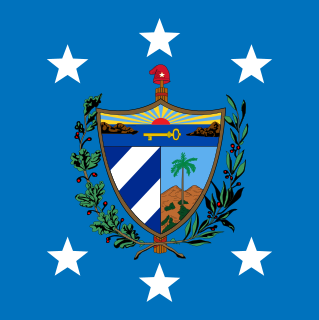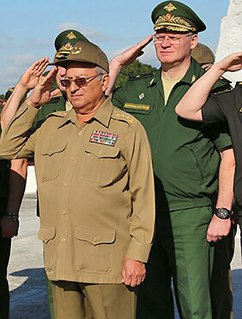 |
|---|
| This article is part of a series on the politics and government of Cuba |
|
Executive |
Judiciary
|
|
A parliamentary election to the National Assembly of People's Power was held in Cuba on 20 January 2008. [1] According to the Cuban electoral system, one candidate was nominated for each of the 614 seats in the Assembly, and candidates were elected if they received at least 50% of the vote. The candidates are otherwise proposed by nominating assemblies, which comprise representatives of workers, youth, women, students and farmers as well as members of the Committees for the Defense of the Revolution, after initial mass meetings soliciting a first list of names. The final list of candidates is drawn up by the National Candidature Commission taking into account criteria such as candidates' merit, patriotism, ethical values and revolutionary history. [2] [3]

The National Assembly of People's Power is the legislative parliament of the Republic of Cuba and the supreme body of State power. Its members are elected from multi-member electoral districts for a term of five years. The Assembly's current President is Esteban Lazo Hernández. The assembly meets twice a year. Between sessions it is represented by the 31 members Council of State. The most recent elections were held on 11 March 2018.

Cuba, officially the Republic of Cuba, is a country comprising the island of Cuba as well as Isla de la Juventud and several minor archipelagos. Cuba is located in the northern Caribbean where the Caribbean Sea, Gulf of Mexico and Atlantic Ocean meet. It is east of the Yucatán Peninsula (Mexico), south of both the U.S. state of Florida and the Bahamas, west of Haiti and north of both Jamaica and the Cayman Islands. Havana is the largest city and capital; other major cities include Santiago de Cuba and Camagüey. The area of the Republic of Cuba is 110,860 square kilometres (42,800 sq mi). The island of Cuba is the largest island in Cuba and in the Caribbean, with an area of 105,006 square kilometres (40,543 sq mi), and the second-most populous after Hispaniola, with over 11 million inhabitants.

Committees for the Defense of the Revolution, or CDR, are a network of neighborhood committees across Cuba. The organizations, described as the "eyes and ears of the Revolution," exist to promote social welfare and report on counter-revolutionary activity. As of 2010, 8.4 million Cubans of the national population of 11.2 million were registered as CDR members.
The date of the election was announced on 20 November 2007. [1] It was considered uncertain whether the ailing Fidel Castro would run for the Assembly, which he had to do in order to continue as President; it emerged in early December that he had been nominated for a seat. Since his illness began in 2006, Raúl Castro had been acting President. [4]

Fidel Alejandro Castro Ruz was a Cuban communist revolutionary and politician who governed the Republic of Cuba as Prime Minister from 1959 to 1976 and then as President from 1976 to 2008. A Marxist–Leninist and Cuban nationalist, Castro also served as the First Secretary of the Communist Party of Cuba from 1961 until 2011. Under his administration, Cuba became a one-party communist state, while industry and business were nationalized and state socialist reforms were implemented throughout society.

The President of the Republic of Cuba, officially called President of the Council of State between 1976 and 2019, is the head of the Council of State of Cuba. The office in its current form was established under the Constitution of 2019. The president is the second most powerful position, after the First Secretary of the Communist Party of Cuba.

Raúl Modesto Castro Ruz is a Cuban politician who is currently serving as the First Secretary of the Communist Party of Cuba, the most senior position in the socialist state, succeeding his brother Fidel Castro in April 2011. He has also been a member of the Politburo of the Communist Party of Cuba, the highest decision-making body since 1975. In February 2008, he was appointed the President of the Council of State and President of the Council of Ministers. He stepped down as President on 19 April 2018, but remains the first secretary of the Communist Party, holding ultimate power and authority over state and government.
María Esther Reus, the President of the National Electoral Commission and Minister of Justice, announced the results of the election on 24 January 2008. Turnout in the election was placed at 96.89%, with 8,231,365 voters participating; 95.24% of the votes cast (7,839,358) were valid. 91% of voters (7,125,752) cast a united ballot for all candidates, while 9% (713,606) chose to vote only for certain candidates. Of the invalid votes, 3.73% (306,791) were blank and 1.04% (85,216) were spoiled. The newly elected Assembly met for the first time on 24 February. [5]
Raúl Castro was re-elected from the 2nd Eastern Front with 99.37% of the vote and Fidel Castro was re-elected from the 7th District of Santiago de Cuba with 98.26% of the vote. [6] Vice-President Carlos Lage and President of the Assembly Ricardo Alarcón respectively won their seats with 92.40% and 93.92% of the vote. [7]

Santiago de Cuba is the second-largest city in Cuba and the capital city of Santiago de Cuba Province. It lies in the southeastern area of the island, some 870 km (540 mi) southeast of the Cuban capital of Havana.

Ricardo Alarcón de Quesada is a Cuban politician. He served as Cuba's Permanent Representative to the United Nations (UN) for nearly 30 years and later served as Minister of Foreign Affairs from 1992 to 1993. Subsequently, Alarcón was President of the National Assembly of People's Power from 1993 to 2013, and because of this post, was considered the third-most powerful figure in Cuba. He also was a Member of the Central Committee of the Communist Party of Cuba until 2013.
On 24 February 2008, the National Assembly began sitting for its new term, and Raúl Castro was elected President Alarcón was elected as President of the National Assembly, while Jaime Crombet Hernández Vaquero was elected as its Vice-President and Miriam Brito was elected as its Secretary. [8]






